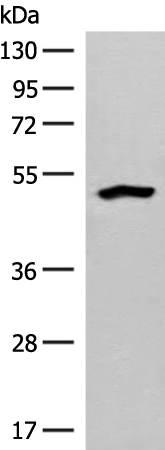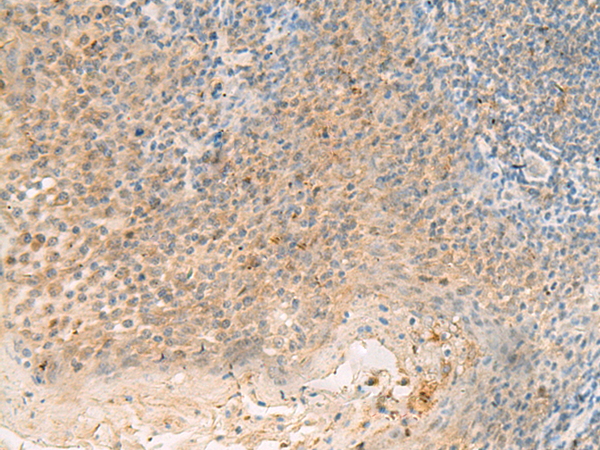

| WB | 咨询技术 | Human,Mouse,Rat |
| IF | 咨询技术 | Human,Mouse,Rat |
| IHC | 1/10-1/50 | Human,Mouse,Rat |
| ICC | 技术咨询 | Human,Mouse,Rat |
| FCM | 咨询技术 | Human,Mouse,Rat |
| Elisa | 1/5000-1/10000 | Human,Mouse,Rat |
| Aliases | FBX9; VCIA1; NY-REN-57; dJ341E18.2 |
| WB Predicted band size | 52 kDa |
| Host/Isotype | Rabbit IgG |
| Antibody Type | Primary antibody |
| Storage | Store at 4°C short term. Aliquot and store at -20°C long term. Avoid freeze/thaw cycles. |
| Species Reactivity | Human, Mouse, Rat |
| Immunogen | Synthetic peptide of human FBXO9 |
| Formulation | Purified antibody in PBS with 0.05% sodium azide and 50% glycerol. |
+ +
以下是关于FBXO9抗体的3篇参考文献,包含文献名称、作者及简要摘要内容:
---
1. **文献名称**:*FBXO9 mediates the cancer-promoting effects of ZNF143 by degrading FBXW7 and promotes drug resistance*
**作者**:Li X, et al.
**摘要**:该研究使用FBXO9抗体通过免疫印迹(Western blot)和免疫沉淀(Co-IP)技术,揭示了FBXO9在结直肠癌中通过降解肿瘤抑制因子FBXW7促进化疗耐药性的机制,为癌症治疗提供了新靶点。
---
2. **文献名称**:*The F-box protein FBXO9 interacts with C9orf72 and regulates autophagy*
**作者**:Tang Y, et al.
**摘要**:研究利用FBXO9抗体进行免疫荧光和蛋白质相互作用分析,发现FBXO9与肌萎缩侧索硬化症(ALS)相关蛋白C9orf72结合,并通过调控自噬通路影响神经细胞存活,提示其在神经退行性疾病中的作用。
---
3. **文献名称**:*FBXO9 contributes to viral immune evasion by targeting IRF3 for ubiquitination and degradation*
**作者**:Wang L, et al.
**摘要**:通过FBXO9抗体的功能研究,本文发现FBXO9在病毒(如HSV-1)感染中泛素化降解IRF3.抑制宿主抗病毒免疫反应,揭示了病毒逃逸天然免疫的新机制。
---
以上文献均涉及FBXO9抗体的实验应用(如Western blot、免疫共沉淀等),并探讨了FBXO9在癌症、神经疾病及免疫调控中的分子机制。如需扩展,可进一步检索近年发表的泛素-蛋白酶体系统相关研究。
The FBXO9 antibody is a research tool designed to detect and study the F-box protein 9 (FBXO9), a member of the F-box protein family. These proteins are critical components of the SCF (SKP1-CUL1-F-box) ubiquitin ligase complexes, which mediate substrate recognition in the ubiquitin-proteasome system, regulating protein degradation and cellular processes such as cell cycle progression, signal transduction, and stress responses. FBXO9 specifically functions as a substrate-recognition subunit, targeting proteins for ubiquitination and subsequent proteasomal degradation. Dysregulation of FBXO9 has been implicated in various diseases, including cancer, neurodegenerative disorders, and immune dysregulation, highlighting its role in maintaining protein homeostasis and cellular health.
Antibodies against FBXO9 are widely used in molecular and cellular biology to investigate its expression, localization, and interaction partners. They enable techniques like Western blotting, immunoprecipitation, and immunofluorescence to analyze FBXO9 levels in different tissues or under experimental conditions. The specificity and sensitivity of these antibodies are rigorously validated using controls such as knockout cell lines or siRNA-mediated knockdown to ensure accurate detection. Researchers also employ FBXO9 antibodies to explore its involvement in disease mechanisms, potential therapeutic targets, and biomarker discovery. As FBXO9's substrates and regulatory pathways remain incompletely characterized, these antibodies are vital tools for advancing understanding of its biological and pathological functions.
×